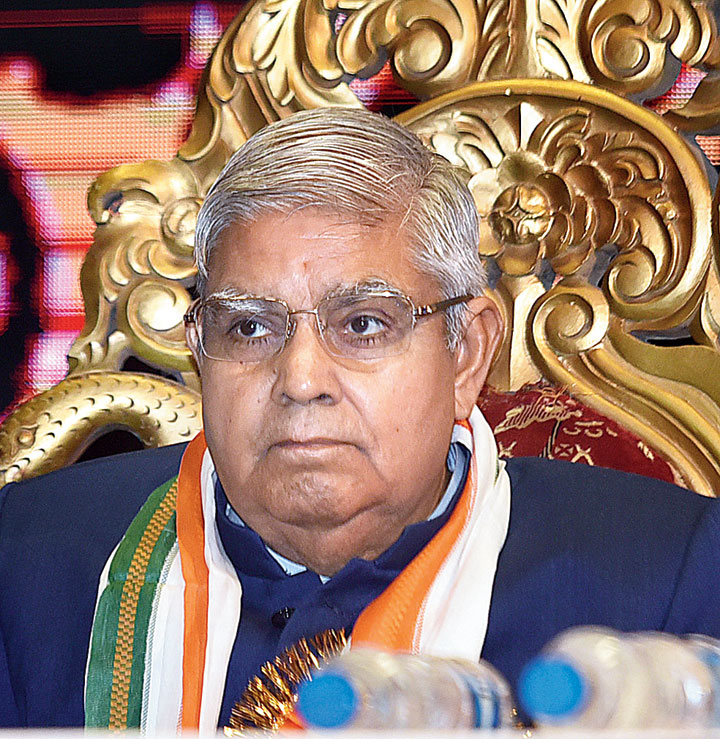The Jadavpur University statutes say the chancellor will have to “confirm” any decision on the choice of DLitt and DSc recipients.
The statutes, however, do not offer any clarity on what happens if the chancellor refuses to confirm the list that the university’s executive council has prepared.
Most years, the confirmation of the list is a mere formality. But the university administration has its fingers crossed this time as the chancellor, Jagdeep Dhankhar, has decided to personally attend and preside over a meeting of the varsity’s court on Friday.
Given his not-so-happy assessment of the JU administration, a section of officials is worried that he might want a larger say in the final choice.
The last time the governor visited JU was to rescue Union minister Babul Supriyo, who was being barricaded by a section of students after a standoff with the BJP leader, on September 19. Supriyo had gone to JU to attend an ABVP meet.
Friday will be the first time in three decades that a chancellor is going to conduct the meeting of the court, the highest forum that “approves” the names of the proposed DLitt and DSc recipients recommended by a committee “composed of the vice-chancellor and Deans of the faculty council”.
The committee’s choice is presented before the executive council. The executive council on September 30 had recommended poet Sankha Ghosh and former foreign secretary Salman Haider for DLitt and scientist C.N.R. Rao and Indian Statistical Institute, Calcutta, director Sanghamitra Bandyopadhyay for DSc.
The council’s recommendation is forwarded to the court for “approval”.
The statute says: “Degrees shall only be awarded if the recommendation of executive council is approved by not less than three-fourths of the members present at the meeting of the court and is finally confirmed by the chancellor. The degree certificate shall be signed by the chancellor.”
According to the university’s statute, the chancellor is the chairman of the court.
Asked why they are worried over getting the confirmation, another university official said, this chancellor had taken steps in the run up to the convocation that they did not encounter before.
Dhankhar had asked JU early this month to elaborate how it drew up a list of this year’s probable DLitt and DSc recipients. Vice-chancellor Suranjan Das had on October 9 met senior JU officials to prepare a note on the selection procedure and a response was sent to the governor’s office on that evening.
“His predecessors would delegate the power to the vice-chancellor to conduct the court meeting. As long as the proposed names did not court any controversy, they did not intervene,” said the official.
Asked about Friday’s meeting, VC Suranjan Das declined comment.
Another university official said, the statutes did not say anything on what was to be done in case a majority of the court accepted the council’s recommendation but the chancellor dissented.
“When the governor refuses to sign a bill sent by the state government, there is a well laid-out provision on what has to be done next. Once the government resends the bill approved on the floor of the Assembly, the governor has to sign it. But the JU statutes do not state anything on whether the executive council can resend the earlier recommendation to the chancellor,” said the official.
Former JU vice-chancellor Abhijit Chakrabarti, however, did not see anything unusual in Dhankhar’s conduct.
“He is well within his rights to make any query on the selection procedure and preside over the court. The university is bound to take confirmation from the chancellor before awarding the honours,” said Chakarbarti, who had to quit in January 2014 following a four-and-a-half month student protest that broke out over his decision to call police to lift a blockade by the students.
Dhankhar had been unhappy with incumbent vice-chancellor Suranjan Das after he refused to call the police to the campus in September 2019.
Governor M. K. Narayanan had in 2012 presided over a meeting of the senate, the highest body of Calcutta University and council meeting of Presidency University, then its apex body.











